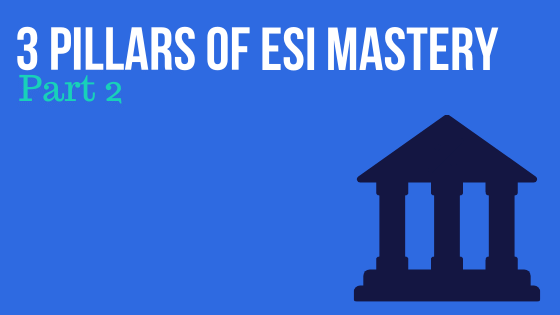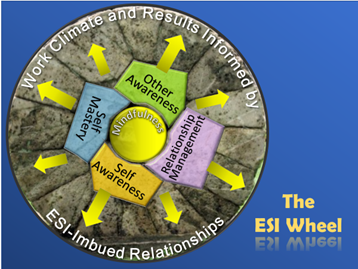Today’s blog is written by Malynn Utzinger, Director of Integrative Practices, and Tim Weitzel, ESI Architect at Promega. Reposted from the Promega Connections blog with permission.
Last month we wrote about the first of three pillars of ESI Self-Mastery: Recognizing and Owning What You Already Have/Are/Do. In this blog, we offer some thoughts on the second pillar: continuously growing our ESI knowledge and skill.
The ESI Wheel
Growing one’s ESI knowledge and skill can encompass a broad diversity of study, practices, and activities. In our ESI Wheel, we focus on five key areas as depicted in the ESI Wheel below.
Mindfulness is the axle upon which everything turns. Everything we have done and everything we will do with ESI is fundamentally about mindfulness and being more present to the current moment.
Self-Awareness is being more mindful about our immediate experience—how we are feeling emotionally, recognizing when we are getting triggered and by what, etc. It is also understanding the bigger picture of our lives, “what we want to do when we grow up,” what our needs are in relationship with others, and more. Mindfulness in this area is the ground on which everything else is built.
Self-Mastery, once we are self-aware, is exercising mindfulness to determine whether our current state of experience is where we want or need need to be. If it is not, then Self-Mastery is using our ESI practices to intentionally regulate our experience. It is growing the inner resources of self-confidence, calm, peace of mind, courage, (whatever you need) in the moment we need it or over a lifetime.
Other Awareness is exercising mindfulness towards our fellow humans (and non-humans, too). We use our empathy (understanding what others are experiencing) and our compassion (caring what their experience is) to dissolve the barriers of aversion, neurotic attachment, or indifference that keeps us separated from one and other. Other awareness is recognizing that we are all in the same boat, and that when we care about other peoples’ experience, we are also caring about our own.
Relationship Management is the culmination of the previous four components. By exercising self-awareness, self-mastery, and other awareness, we are now in a much stronger position to mindfully and effectively engage others. Mindfulness in relationship management helps us determine the best approach to working with others. Do I need to be strong and assertive here? Or is a more amiable and collaborative approach in order?
All the above culminates in work climates and relationships imbued with emotional and social intelligence.
Following your own curiosity
Fundamentally, ESI is mindfulness about life and all the relationships that encompasses, with ourselves, with others, with the non-human world, and more. There are nearly infinite resources out there: books, videos, workshops and retreats, hobbies (art, biking . . . you name it) that would help you develop and grow your ESI mindfulness toolkit. Go have a blast! Stuff your toolbox until it resembles a cornucopia!
WOULD YOU LIKE TO SEE MORE ARTICLES LIKE THIS? SUBSCRIBE TO THE ISHI BLOG BELOW!
SUBSCRIBE NOW!



